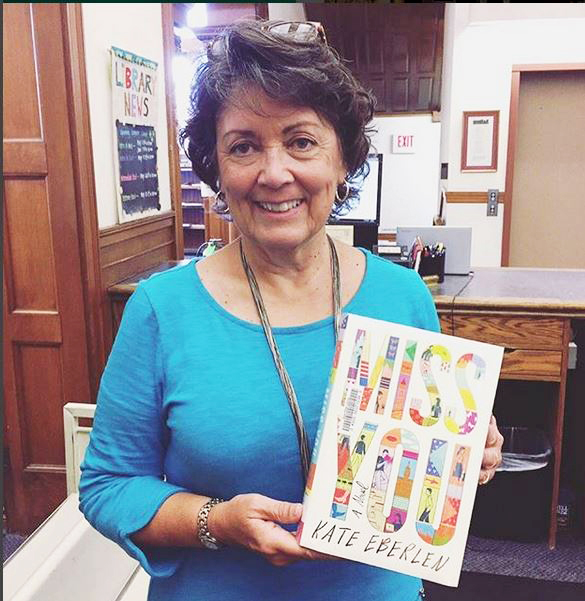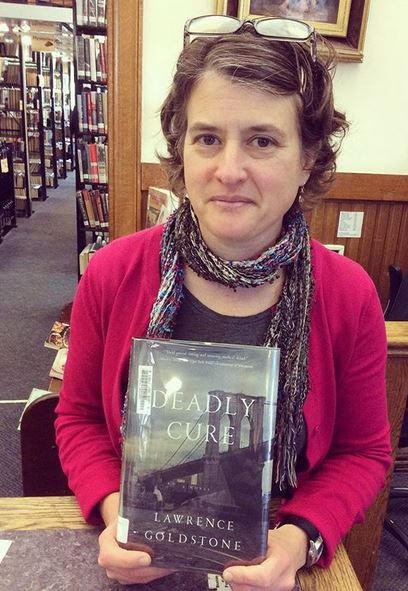Disclaimer
The Dover Public Library website offers public access to a wide range of information, including historical materials that are products of their particular times, and may contain values, language or stereotypes that would now be deemed insensitive, inappropriate or factually inaccurate. However, these records reflect the shared attitudes and values of the community from which they were collected and thus constitute an important social record.
The materials contained in the collection do not represent the opinions of the City of Dover, or the Dover Public Library.
Dover Public Library History
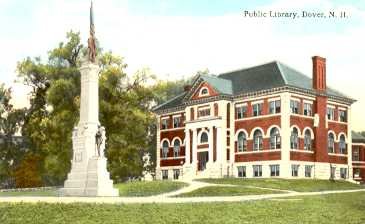
In 1833, the town of Peterborough NH became the site of the first public Library in the United States.In 1849, New Hampshire was the first state to enact legislation authorizing the establishment of Public Libraries. Dover's public library did not come into existence until 1883, but the city has a long history of private and subscription libraries.
The first library in Dover existed before the English colonies became the United States of America. It is probable that Jeremy Belknap was influential in its formation. A document notifying a Daniel Hayes of his election to membership in the Dover Social Library on July 4, 1776 signed by Dr. Belknap may still be seen in the present library. The Social Library, comprised of 199 volumes of divinity, history and philosophy, was incorporated December 18, 1792. It was the first one in New Hampshire and lasted until 1820.
The next Library was that of Mr. S.C. Stevens. It was a circulating library contained in his bookstore and stocked less morality and more entertainment than did the Social Library. A citizen could subscribe by the year for $5.00. The bookstore/library passed into the hands of Eli French, then to Deacon Edmund J. Lane and his son, and did not go out of existence until after the opening of the public library in 1884.
In 1850, steps were taken to incorporate a general library association known as Dover Library. Its founder was Dr. T.J.W. Pray. Stockholders in the association paid $5.00 a share plus a $1.00 assessment fee. There were also yearly subscribers whose fees were "males $1.25, females 75 cents" but who had no vote. Elected officers and a librarian all served without pay.Stock certificates purchased the first year totaled $472.88. The library was housed "in a room fitted up for it by the treasurer of the Cocheco Manufacturing Company". The collection of more than 300 books circulated over 4500 times in the first three years.
As early as 1856, librarian E.J. Lane suggested in his annual report that the city "should take the library, add to it, and make it worthy of the city". Ten years later, a committee was formed to confer with city officials about transferring the library to the city but no further action was taken. After the Dover Library Association received a bequest of $2000 in 1878, it formally asked the city to "give such annual appropriation as would permit the benefits of the institution to be enjoyed by all." Although public sentiment was in its favor, action was delayed.
It was not until January of 1883 that Mayor James E. Lothrop proposed a public library in his inaugural address. In September of that year, the Association's stockholders voted 92 to 36 to give its several thousand volumes and $2,432.10 in cash to the city. Thomas B. Garland was elected librarian the next month, but was shortly succeeded by his daughter Caroline.
On January 14, 1884, the Public Library opened to the residents of Dover with 4,508 volumes and an author and title catalog. The librarian, Miss Garland, recalled opening day, "The work had been carried on incessantly up to within a few minutes of the hour of opening; but about five minutes before two, she sat down in a great depression of mind. Had it been worthwhile, and would anybody come? The clock struck two and the door creaked open. Three high school boys rushed up the stairs. Following them was a woman who had been sent by her sick son at home. Close behind her were more high school boys and some men. Then came a few ladies who had not wanted to push. In a few seconds the room was full. With very unsteady knees she rose to her work. "Ivanhoe" was the first book wanted. The mother of the sick boy went home with "Adventures of a Young Naturalist". Thus did the Library begin its ministry to the sick." There were 180 people registered and 160 took books that first day. A rousing success, the Dover Public Library recorded 2300 borrowers during that first year and in its first decade of operation circulated over half a million volumes.
The Library soon outgrew its Cocheco Block quarters. It moved to the Odd Fellows building on Washington Street on July 2 and 3, 1886, "the hottest days of the year".Within five years the Library collection had outgrown its new home. The Library moved on December 8 and 9, 1891 "the coldest days of the year" to the ground floor rooms in the newly built City Hall.
Librarians, citizens, and trustees recognized the need for a separate building as the Library continued to grow. These interested people appealed to philanthropist Andrew Carnegie for funds to construct a new facility. Mr. Carnegie responded with this offer, "If the City of Dover pledges itself by resolutions of councils to support a free library at a cost of not less than $3000 a year, and provide a suitable site, I would be pleased to furnish $30,000 for the erection of a free public library building."
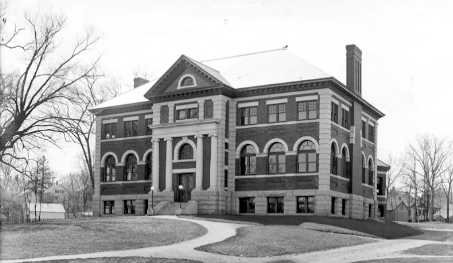
On April 30, 1902, the Franklin Academy trustees offered the "Hale Lot" on Locust Street as a gift to the City with the condition that it be used for library and school purposes. The city council accepted the gifts of Andrew Carnegie and the Franklin Academy trustees. In 1903 architects Randlett & Griffin were chosen to design the new building and Walter H. Sargent was contracted to build. The foundation was laid in the fall and the brick work was put up in the spring of 1904. The building was completed in June 1905 at a cost of $29,675. Shelving, furniture and architects fees added an additional $9500 to the final price. The building, housing 33,000 volumes, was formally dedicated on July 19, 1905 with a speech by the Mayor and delivery of keys to the chairman of the building committee.
In 1909, the NH Genealogical Society donated its own collection to the Dover Public Library. Further donations by John Scales, Elisha Rhodes Brown, John Ham, and George Wadleigh helped build the highly regarded Historical Room to its present size: 4000 items of local and state history.
Miss Caroline Garland, whose keen interest in history sparked this remarkable collection, served for 50 years as the librarian. She oversaw such developments as the landscaping of the grounds and dedication of the Civil War Soldiers Monument on October 19, 1912, library war relief efforts, and an ever increasing circulation.
After Miss Garland's death in 1933, the Library was ably served by her assistant, Miss Beatrice Jenkins, until her retirement in 1945. Miss Jenkins presided over an interesting phenomenon noted in most public libraries: the amount of use is inversely proportional to the direction of the economy. During the depression, when unemployment was high, leisure time was great, and money was scarce, use of the Library was at an all time high. During World War II, the economy was booming and leisure time was scarce, library use decreased. T he Library was active in the war effort, collecting books for soldiers, funds for war-torn Dover, England, clothing for Finland, and collecting and distributing knitted articles for servicemen.
Miss Anne Elizabeth Leach served as the fourth librarian of the Dover Public Library. She instituted many professional library practices including conversion to the Dewey Decimal cataloging system. After Miss Leach's death, Miss Mildred Morrison, who had served as an assistant to the three previous librarians, was appointed.
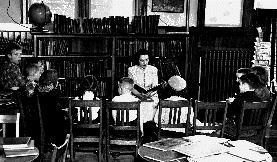
Miss Morrison oversaw the first major renovation in the Library's history: the construction of a new entrance from the parking lot leading into a brand new Children's Room. Until 1966, the Children's Room was located in what is now the Browse Room on the main floor. The Library also served as the school library for Dover High School next door, and more space was needed to accommodate all the students. A basement storage area was renovated at a cost of $23,429 with funds from the city and federal governments, trust funds, and the Judson Dunaway Foundation. The room formally opened on January 10, 1966.
Donald K. Mullen became Director of the Library upon the retirement of Miss Morrison in 1969. Mr. Mullen supervised a staff of eight full-time and sixteen part time employees, a 90,000 item collection of books, periodicals, and audio-visual materials with a circulation of 268,000 annually. In his nearly thirty year tenure, Mr. Mullen initiated many new services including the development of extensive paperback, books-on-tape and videocassette collections, a professional staff of certified librarians, and the computerization of library functions.
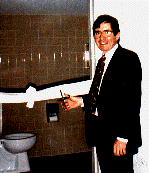
But the major changes overseen by Mr. Mullen were the renovations to the 93 year old Carnegie building from 1984-1986 and the construction of a 5600 square foot addition in 1988. This $1.2 million project began in 1982 with a space needs study and was completed in three phases with city CIP funds. In 1990, the long-term renovations were at last finished when new tables, chairs, and desks were purchased for the expanded spaces and a mezzanine level (capacity 9000 volumes) was built over the existing stacks.
Improvements to the building included an elevator, new wiring and lights, gas heat, new carpeting and paint, a sprinkler system, insulation and ventilation, air-conditioning for some areas, a new emergency stairway, structural reinforcements, a kitchenette and refurbished Lecture Hall, new restrooms, a water fountain, an enlarged Children's Room and expanded periodicals and seating area. During all the commotion caused by construction spanning seven years, the Library only closed for two days as staff and patrons alike learned to work with noise, dust and disturbances.
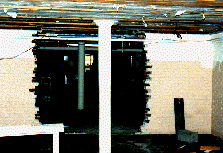
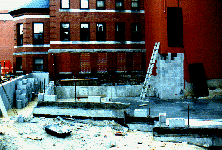
Once the Dover Public Library building was structurally functional for the next century, the Library staff began implementing the next leap forward: electronic information technology. In 1994, we began the process of automating all internal operations including acquisitions, cataloging, registration, overdues and other circulation functions. In a cooperative venture with the Dover school libraries, the five school libraries' collections were electronically linked to the Dover Public Library providing a cohesive city-wide library system. Launched in December 1995, the system offers online access and a multitude of research databases from in-house of home computers. Public Internet access is also widely available in the Library. Library staff offer private tutorials on using the Internet and all electronic resources. The Library now provides DVDs, music CDs, books on tape and CD, and museum passes in addition to traditional print materials. In 1997, the Dover Public Library won the City of Dover's Department Of The Year award.
In January 1999, Assistant Director Cathy Beaudoin took over leadership from Don Mullen when he retired. Cathy kept the library on the cutting edge, starting new collections of DVDs and music CDs, as well as offering online magazines, books, audiobooks, music and movies. She loved trying new ideas, whether it was relocating collections or starting a passport program. Cathy was always willing to let the staff try new things, and the Library and all its services are a reflection of her passionate leadership. Cathy retired March 27, 2020 after 44 years of service.
On March 19, 2020, the library closed due to the Covid 19 pandemic. While the building remained closed to the public, the staff continued answering phone calls and emails, created a curbside book pick up service, and provided expanded digital library services. The library reopened Monday, June 22 with Covid protocols in place.
Denise LaFrance became director of the Dover Public Library March 28, 2020. Denise worked as a Reference Librarian at the library for the previous twenty years so she knows the community and the collection well. Under Denise's leadership, the library has been designated a safe, judgment-free place by the Dover Mental Health Alliance and a Recovery Friendly Workplace by Gov. Chris Sununu, becoming the first organization in the City of Dover and the state to have both designations.
In the spring of 2022 the Library is getting a new slate roof after 117 years! We hope the new roof will serve us as long and well.
We have come a long way from the days when Miss Garland hoped for patrons' visits.
This historical essay is provided free to all readers as an educational service. It may not be reproduced on any website, list, bulletin board, or in print without the permission of the Dover Public Library. Links to the Dover Public Library homepage or a specific article's URL are permissible.

